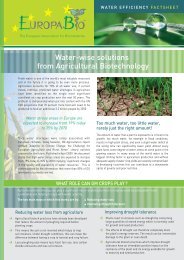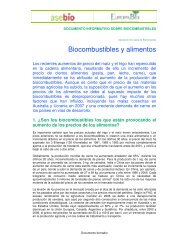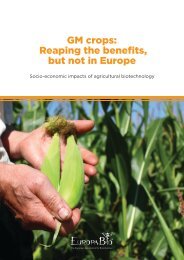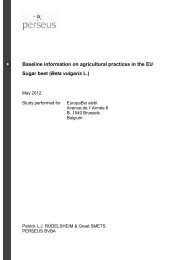Biotechnology: Making Biofuels More Sustainable - Europabio
Biotechnology: Making Biofuels More Sustainable - Europabio
Biotechnology: Making Biofuels More Sustainable - Europabio
You also want an ePaper? Increase the reach of your titles
YUMPU automatically turns print PDFs into web optimized ePapers that Google loves.
<strong>Biotechnology</strong>:<br />
<strong>Making</strong> <strong>Biofuels</strong> <strong>More</strong> <strong>Sustainable</strong><br />
To move towards a future with a sustainable energy supply and healthy consumer goods<br />
production, every solution is important. For this reason, energy use must become more and more<br />
efficient, production processes must be improved and the full potential of new technologies<br />
must be realized. Industrial biotechnology with its competitive, clean and clever use of bio-based<br />
technologies can play a key role in making biofuels more sustainable.<br />
A sustainable energy supply is needed to keep Europe’s economy<br />
growing, jobs safe, and ensure energy security. The need for EU<br />
sourced fuels is evident. As prices are rising for oil, a knock on<br />
effect can be felt in industries that rely heavily on imported oil<br />
– including the transport, chemical and materials industries.<br />
Long term alternatives are needed and biofuels (such as<br />
ethanol, vegetable oil for biodiesel or new fuels like butanol or<br />
syndiesel 1 ) can serve as a fuel and even be further transformed<br />
into chemicals and materials. First generation biofuels, based on<br />
sugar, starch or oil are a necessary first step to allow development<br />
BIOFUELS BROCHURE<br />
<strong>Biofuels</strong> contribute substantially to Europe’s Lisbon Strategy for growth and jobs<br />
and establishment of second generation biofuels (lignocellulose<br />
and waste based) and advanced biofuels.<br />
A European Commission impact assessment 2 showed that -as a<br />
result of the biofuels targets- the EU would see a 120,000 increase<br />
in net employment and a 0.17% rise in the overall EU’s GDP,<br />
assuming all biofuels are produced domestically from European<br />
feedstocks. Finally, thanks to first and second generation biofuels,<br />
European farmers will be able to live on their production rather<br />
than receiving subsidies in exchange for lower production levels.<br />
Biofuel technologies are able to manufacture biofuels from biomass. The OECD definition of biomass<br />
is ‘any organic material, of plant and animal origin, derived from agricultural and forestry production<br />
and resulting by-products, and industrial and urban wastes’.
BIOTECHNOLOGY: MAKING BIOFUELS MORE SUSTAINABLE<br />
Measures must be put in place to ensure a sustainable energy supply.<br />
The cost of not doing anything to develop biofuels now - or only looking<br />
at solid biomass for electricity and heating - would be very expensive<br />
for future generations. It would prevent the development of cheaper<br />
and more eco-efficient advanced biofuels and mean continued and<br />
expensive dependence on ever-scarcer fossil fuels.<br />
<strong>Biofuels</strong> can contribute to the EU Lisbon Strategy for Growth and Jobs 3 .<br />
Studies have estimated that to meet the 2010 biofuels targets, 30,000<br />
jobs will be created in France alone 4 . <strong>Biofuels</strong> and biorefineries can also<br />
encourage rural development in the new Member States and serve<br />
as a catalyst for the declining agricultural sector in Eastern Europe.<br />
<strong>More</strong>over, the jobs created as a result of biorefinery development<br />
demand a high level of education – taking advantage of Europe’s<br />
highly educated population.<br />
<strong>Biotechnology</strong>: An Essential Technology to Produce Competitive and <strong>Sustainable</strong> <strong>Biofuels</strong><br />
In order to achieve the goals of biofuel use set by the European Union,<br />
which call for a replacement of liquid fuel from transportation by<br />
5.75% in 2010 and 10% in 2020 in a sustainable and competitive<br />
way, the available biomass in Europe will need to increase. Cultivating<br />
energy crops on set-aside and non-cultivated land will help, but this<br />
won’t be sufficient to fulfil all the demand. It will also be critical to<br />
increase land productivity, meaning more biomass output per hectare,<br />
as well as crop quality, meaning crops that produce more fermentable<br />
carbohydrates or have a higher oil content. This can be done via plant<br />
science, modern plant breeding techniques and biotechnology in<br />
combination with state-of-the-art application of crop protection.<br />
Another important step to increase the biofuel production will be the<br />
competitive production of biofuels from (hemi)cellulose and organic<br />
agricultural waste instead of from starch, sugar and oils. These are the<br />
second generation biofuels. Innovation in industrial biotechnology,<br />
especially the development of enzymes that can convert (hemi)<br />
cellulose with improved efficiency is key to the development of second<br />
generation biofuels.<br />
First generation biofuel is produced by fermenting plant-derived sugars to ethanol, using a similar process to<br />
that used in beer and wine-making, or by converting plant-oils to biodiesel. It requires crops such as sugar cane,<br />
corn, wheat, oil seed rape or sugar beet. Although the GHG reduction potential of first generation biofuels may<br />
be lower than what can be expected from future technologies (second generation products), it is important<br />
that a market for biofuel be established as soon as possible in order to attract the necessary investments and<br />
to establish the infrastructure (production and logistics) in Europe. Improved farming technologies and next<br />
generation processes, where biotechnology can play a major role, are needed to improve the eco-efficiency<br />
of biofuel production.
<strong>Biotechnology</strong> is today one of the most effective and innovative tools<br />
we have to meet European targets for biofuel use, while reducing the<br />
adverse environmental impacts of transport, and limiting the impact of<br />
the increased cultivated land. Biotechnological techniques can help to:<br />
• Increase biomass yield per hectare while reducing the needs for<br />
production inputs;<br />
• Improve crop quality (higher biofuel yields);<br />
• Reduce land-use competition through higher productivity and<br />
reduced losses from biotic (insect, viruses, etc) and abiotic<br />
(environmental such as drought, wind, salinity) stresses;<br />
• Contribute to the cultivation of energy crops in areas with marginal<br />
conditions;<br />
• Develop efficient micro-organisms and enzymes to convert the<br />
(hemi)cellulose to sugars, which can then be fermented into<br />
biofuel.<br />
<strong>Biotechnology</strong> leads<br />
to more environmentally friendly biofuels<br />
To stop the ever-increasing petrol consumption and ever-heightening<br />
GHG emissions in the transport sector, there are few short to medium<br />
term alternatives but to combine further leaps forward in automobile<br />
fuel efficiency with biofuels. First generation biofuels can already be<br />
blended with today’s fuels and used in existing cars, without the need<br />
for major modifications in the vehicles.<br />
Several studies have been published on the eco-efficiency of biofuels.<br />
They found that CO 2 savings with the present biofuel technologies<br />
are estimated to be between 20 and 80% compared with using<br />
conventional petrol. This can increase to 90%- and higher - for<br />
second generation biofuel such as cellulosic ethanol or syndiesel. High<br />
productivity and energy feedstocks, less fuel intensive cultivation of<br />
crops and low carbon conversion processes could further help us to<br />
achieve this. These figures, however, depend largely on the feedstocks,<br />
the conversion process and the impact of land use. A common<br />
methodology needs to be agreed at the international level.<br />
BIOFUELS BROCHURE<br />
All plants contain cellulose and lignin. Ligno–<br />
cellulose is a complex structure containing<br />
carbohydrate. Cellulosic ethanol is made by freeing<br />
the sugar molecules from cellulose using enzymes.<br />
These sugars can then be fermented to produce<br />
ethanol in a similar way to first generation bioethanol<br />
production. Chemical conversion processes can also<br />
be used to convert the lignocellulosic biomass into<br />
syndiesel. The greenhouse gas emissions savings<br />
for lignocellulosic biofuels are greater than those<br />
obtained by first generation biofuels. It is currently<br />
estimated that lignocellulosic biofuel has the<br />
potential to reduce greenhouse gas emissions<br />
by around 90% when compared with fossil<br />
petroleum.
BIOTECHNOLOGY: MAKING BIOFUELS MORE SUSTAINABLE<br />
While we need the first generation biofuels as a stepping stone to<br />
develop a market and to achieve success with the second generation<br />
biofuels, many experts agree that second generation feedstocks<br />
will be more sustainable and more productive than first generation<br />
feedstocks. In addition, second generation biofuels will also focus on<br />
using residual non-food parts of current crops as well as other crops<br />
that are not used for food purposes, such as switch grass, cereals that<br />
bear little grain and more fibre, wood chips, etc.<br />
While first generation biofuel processes are a useful<br />
tool to mitigate green house gas emissions in the<br />
transport sector, second generation biofuels will<br />
supply a larger proportion of our fuel supply and<br />
render production more sustainable, affordable,<br />
and with greater environmental benefits.<br />
References and Further Reading<br />
1 Diesel obtained from gasification of biomass and chemical transformation<br />
2 <strong>Biofuels</strong> Progress Report: Report on the progress made in the use of biofuels and other renewable fuels in the Member States of the<br />
European Union – SEC(2006) 1721 http://ec.europa.eu/energy/energy_policy/doc/08_biofuels_progress_report_annex_en.pdf<br />
3 EU Lisbon Strategy for Growth and Jobs - COM (2005) 24 http://ec.europa.eu/growthandjobs/pdf/COM2005_024_en.pdf<br />
4 Speech of Michel Barnier at INRA (French National Institute for Agricultural Research) http://agriculture.gouv.fr/sections/presse/discours/laboratoires-inra-site-d<br />
Other factsheets in the series available on: http://www.europabio.org/<strong>Biofuels</strong>/<strong>Biofuels</strong>_about.htm<br />
EuropaBio’s (the European Association for Bioindustries) mission is to promote an innovative<br />
and dynamic biotechnology-based industry in Europe. EuropaBio’s corporate and associate<br />
members operate worldwide.<br />
For further information please contact:<br />
EuropaBio<br />
Avenue de l’Armée 6<br />
B-1040 Brussels<br />
Tel : +32 2 735 03 13<br />
Fax : + 32 2 735 49 60<br />
info@europabio.org<br />
April 2008
















